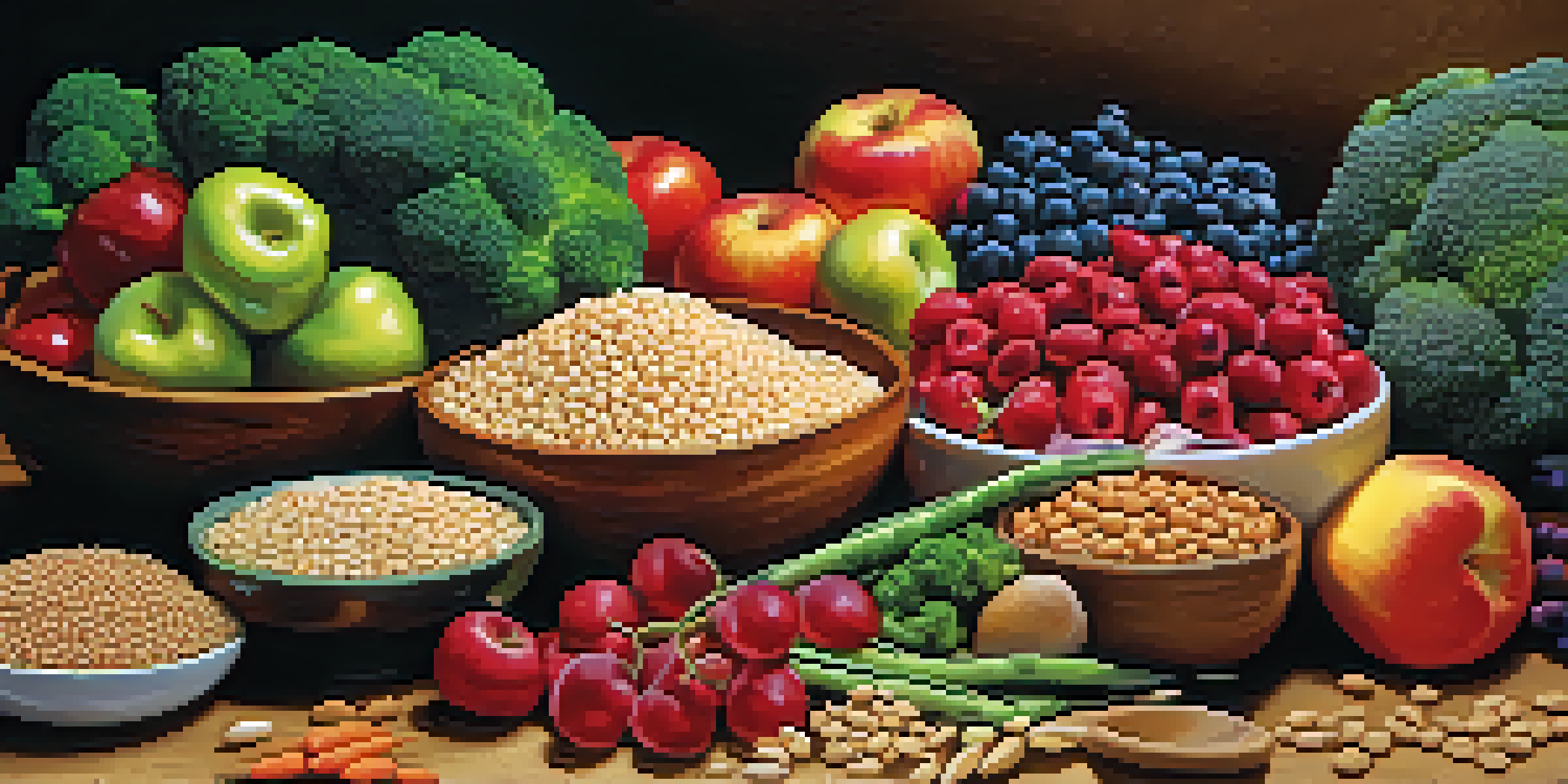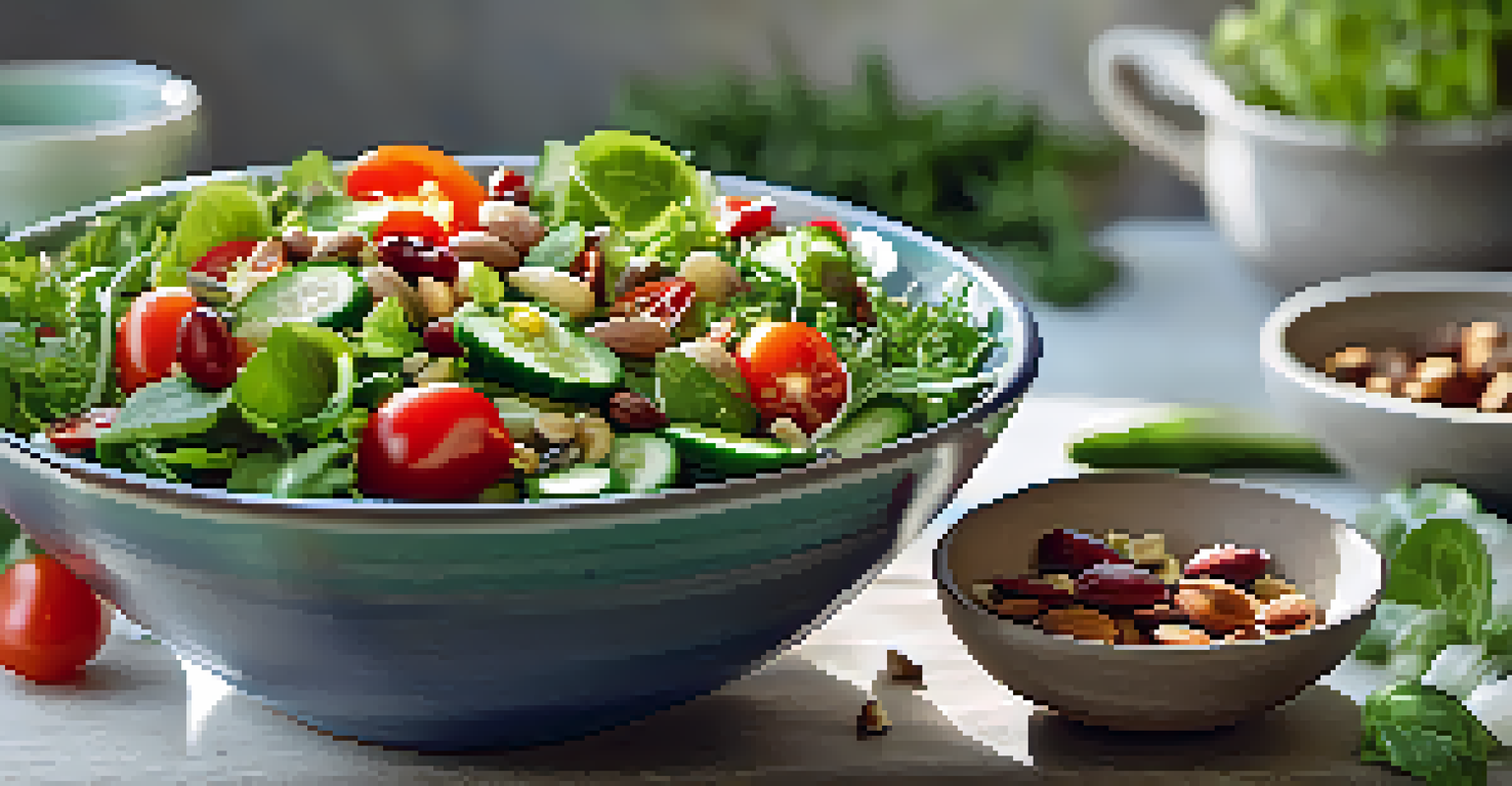The Role of Fiber in Maintaining a Healthy Gut Microbiome

Understanding the Gut Microbiome and Its Importance
The gut microbiome is a complex community of trillions of microorganisms living in our intestines. These tiny organisms play a crucial role in digestion, immune function, and even mental health. Just like a garden thrives with the right nutrients, our microbiome flourishes when we provide it with the right foods.
The gut microbiome is a delicate ecosystem, and fiber is its most important food source.
A diverse microbiome can help prevent a range of health issues, from digestive disorders to obesity. It’s fascinating to think that the health of our gut can impact everything from our mood to our immune response. This is why maintaining a balanced gut microbiome is vital for overall well-being.
Fiber is one of the key players in nurturing this ecosystem. By understanding how fiber influences our gut health, we can make better dietary choices that support our microbiome and, ultimately, our overall health.
What Is Fiber and Why Is It Essential?
Fiber is a type of carbohydrate that our bodies cannot digest. Unlike other carbs that break down into sugar, fiber passes through our digestive system largely intact, helping to regulate our digestion. It’s divided into two main types: soluble and insoluble, both offering unique benefits.

Soluble fiber dissolves in water and can be found in foods like oats, beans, and apples. It helps to slow digestion and can lower cholesterol levels, which is great for heart health. On the other hand, insoluble fiber, found in whole grains and vegetables, adds bulk to our stool and supports regular bowel movements.
Gut Microbiome's Vital Role
A balanced gut microbiome is essential for digestion, immune function, and mental health.
Incorporating a variety of fiber types in our diet not only aids digestion but also feeds the beneficial bacteria in our gut. This is crucial because these good bacteria play a pivotal role in maintaining a healthy gut microbiome.
How Fiber Fuels Beneficial Gut Bacteria
One of the most fascinating aspects of fiber is its role as food for our gut bacteria. This process is known as fermentation, where certain types of fiber are broken down by bacteria, producing short-chain fatty acids (SCFAs) as a byproduct. SCFAs are beneficial for gut health, reducing inflammation and enhancing gut barrier function.
You are what you eat, and it is especially true when it comes to your gut health.
When we consume fiber, we essentially create a feast for our beneficial gut bacteria. The more diverse the fiber sources in our diet, the more diverse our microbiome becomes, which is linked to better health outcomes. This symbiotic relationship emphasizes the importance of fiber in our daily meals.
Think of it like hosting a dinner party for your gut bacteria. The more variety you offer, the happier and healthier your guests will be, leading to a thriving microbiome.
The Impact of Fiber on Digestive Health
Fiber plays a pivotal role in promoting digestive health. It helps to prevent constipation by adding bulk to the stool and making it easier to pass. Regular consumption of fiber-rich foods can lead to more consistent bowel movements, reducing discomfort and bloating.
Furthermore, fiber can help manage digestive disorders such as irritable bowel syndrome (IBS) or inflammatory bowel disease (IBD). Studies show that a high-fiber diet can alleviate symptoms and improve overall gut function.
Fiber Fuels Good Bacteria
Fiber acts as food for beneficial gut bacteria, promoting a diverse and healthy microbiome.
In essence, fiber acts as a natural broom, sweeping through our intestines and ensuring everything runs smoothly. By prioritizing fiber in our diets, we can significantly enhance our digestive health.
Fiber's Role in Weight Management
In addition to supporting gut health, fiber can also help with weight management. High-fiber foods are often more filling, which can help reduce overall calorie intake. When we feel full, we’re less likely to snack mindlessly or overeat at meals.
Moreover, the slow digestion of fiber means that energy is released gradually, keeping us satisfied for longer periods. This can stabilize our blood sugar levels, preventing those pesky energy crashes that lead to cravings.
Think of fiber as your diet's best friend, helping you feel satisfied while nurturing your gut at the same time. It’s a win-win situation for those looking to maintain a healthy weight.
Choosing the Right Fiber Sources
When it comes to incorporating fiber into your diet, variety is key. Aim to include a wide range of fiber-rich foods like fruits, vegetables, legumes, nuts, and whole grains. Each type of food offers different types of fiber and unique benefits for your gut microbiome.
For example, berries are a fantastic source of soluble fiber, while beans provide both soluble and insoluble fiber. Whole grain products, such as brown rice and whole wheat bread, are excellent choices for getting the fiber you need.
Fiber Aids Digestive Health
Regular fiber intake prevents constipation and can alleviate symptoms of digestive disorders.
By mixing and matching different fiber sources, you can keep your meals interesting while ensuring your gut bacteria are well-fed and happy.
Tips for Increasing Fiber Intake Gradually
If you're looking to boost your fiber intake, it’s important to do so gradually. Sudden increases in fiber can lead to digestive discomfort, such as bloating or gas. Start by adding one or two servings of fiber-rich foods to your meals each day and increase as your body adjusts.
Drinking plenty of water is also essential when increasing fiber in your diet. Water helps to move fiber through your digestive system and prevents any potential discomfort. Aim to drink at least eight glasses of water a day, especially if you’re consuming more fiber.

Remember, it's a journey, not a race. By making small, sustainable changes to your diet, you’ll be well on your way to enjoying all the benefits that fiber has to offer for your gut microbiome.